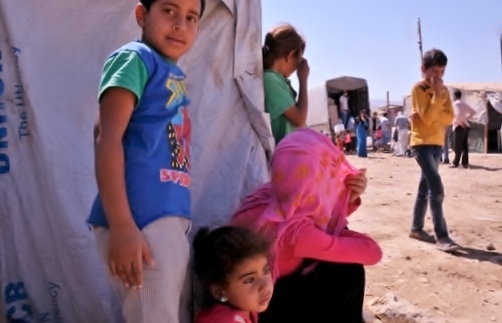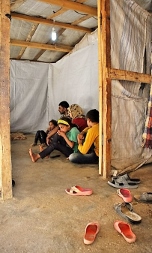
One in every 113 people on earth is a refugee, according to UN figures; yesterday at its General Assembly in the US, it adopted the New York Declaration aimed at reaching a more humane and coordinated approach to large movements of refugees and migrants. At the meeting, UN Secretary-General Ban Ki-moon urged world leaders to “commit together to upholding the rights and dignity of everyone forced by circumstance to flee their homes in search of a better life”.
By comparison to the global ratio, 1 in 5 people in Lebanon is a refugee. It is, by far, the country with the highest number of refugees per inhabitant, second only to Turkey in accepting the highest number of refugees from Syria (2 million) – at currently 1.4 million.
A new responsive video filmed inside a Lebanese camp for Syrian refugees highlights the poor living conditions that the New York Declaration hopes to address. Produced by Open Doors, a charity that provides support to Christians under pressure for their faith, it’s filmed through a 360⁰ lens that allows viewers to move the camera angle at any point just by a click and drag of the mouse.
The 3’30” video starts with the camera crew driving to the camp. The viewer is asked to ‘look right’ at the mountains separating Lebanon from Syria – to view the mountains, the viewer must use their mouse to interact with the film. Inside the camp, the film shows just some of the people forced to live long-term in makeshift tents after fleeing Syria.
Across Lebanon’s mountainous border are even more Syrians finding shelter before trying to get out. The population of Syria has undergone the ‘largest displacement crisis globally’ says the UN – more than half its pre-war population of 22 million is no longer living in their own home. About 7.6 million Syrians are internally displaced; latest figures show 4.8 million are registered refugees outside it. Is estimated that of the 1.8 million Christians living in Syria before the war only 600,000 – 900,000 remain.
The city of Aleppo had one of the largest Christian populations in Syria before the war, but that number has dwindled from 250,000 to fewer than 40,000, according to Open Doors’ (OD) World Watch Research Unit. The besieged city has been on the front line of fighting between the government, rebel forces and Islamic State for much of the war.
Most Syrian refugees are in the neighbouring countries of Turkey (more than 2 million), Lebanon (1.4 million) and Jordan (623,000). Many are forced to live in camps in the desert in poor conditions and away from cities where they would stand a better chance of finding work.
An estimated 1 million Syrian refugees found their way to Europe, the Americas and Australia.

Thousands of Christians have also left Iraq, or been internally displaced, because of conflict involving Islamic State. Iraq’s second city, Mosul, currently occupied by IS, was home to one of the largest Christian communities in the Middle East at the time of the 2003 US invasion. Across the river Tigris from the former city of Ninevah (in the Old Testament book of Jonah), it’s been home to Christians for two millennia, but they are now on the verge of extinction from the city.
Exact numbers of Christians to have fled Syria and Iraq are unknown, but the OD World Watch Research Unit calculates that 1 in 4 refugees from these is a Christian.
In Europe, some are known to avoid refugee transit centres because they fear being potential targets of religiously motivated crimes.
Christians living in French transit camps have been harassed – one apparently murdered – by other immigrants from the Middle East. Christians in refugee centres in Germany have faced religiously motivated abuse and violent attacks from other refugees and Muslim security officials. Muslims who have converted to Christianity, because they are often seen as ‘apostates’, are especially vulnerable.
Following yesterday’s meeting of the UN General Assembly to address the refugee crisis, President Obama will today host a separate leaders’ summit that will attempt to raise money and secure concrete pledges from countries to accept higher numbers of refugees for resettlement.